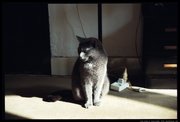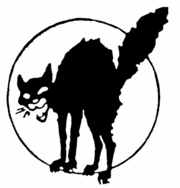
 A black cat in Nijmegen, the Netherlands.
A black cat in Nijmegen, the Netherlands.
The black cat is a feline whose fur is uniformly or mostly black. It is not a particular breed of cat and may be mixed or of a specific breed. In Western history, black cats have often been looked upon as a symbol of bad omens.
Historical associations
 The black cat in a fighting stance is a historically important
anarchist symbol.
The black cat in a fighting stance is a historically important
anarchist symbol.
Historically, black cats were symbolically associated with witchcraft and evil. In Hebrew and Babylonian folklore, cats are compared to serpents, coiled on a hearth. In the Middle Ages, Germanic peoples and the Normans associated the black cat with bad luck . To some, they were an omen of impending death. On roads, a black cat crossing one's path was considered a signal of danger ahead.
Since the 1880s, the color black has been associated with anarchism. The black cat, in an alert, fighting stance was later adopted as an anarchist symbol. More specifically, the black cat is associated with anarcho-syndicalism, a branch of anarchism that focuses on workers' rights. Anarchists, Situationists and Revolutionary Industrial Unionists (such as the IWW) believe that wildcat strikes could be the spark for revolution.
In the 1930s, the Wiccan religious tradition emerged. Since much of Wicca is reconstructed from supposed witchcraft practices, the black cat was adopted as a Wiccan symbol.
The archaic associations of black cats with bad luck or evil appear occasionally in North American popular culture, but are no longer widely held. Contrarily in the UK black cats are the most well known sign of good luck and have always been so. By some human beings, black cats are seen as desirable pets.
Eveready Batteries uses a black cat leaping through the digit 9 as its logo - one of the most recognizable company trademarks.
Witchcraft
Cats, in witchcraft folklore, are often believed to be familiars of human witches, because of their purported psychic and magical abilities. Both historically and in modern times, those who practice witchcraft often keep cats as pets.
Black cats, because of their ability to remain unseen in dark places or at night, were considered especially desirable partners for witches. Some witches were purported to have the ability to shape-shift into a cat nine times, hence the archaic belief that cats have nine lives . Black cats were sometimes used in magical rituals, sometimes as purported participants, other times as sacrifices.
In witch trials, ownership of a cat was often taken as evidence of Satanic association and witchcraft. Cats, believed to be evil in their own right, were often punished as well as humans during these trials, often being burned alive.
Both historically and today, some religious and spiritual groups purportedly engage in ritualistic sacrifice of cats, though studies have mainly found that such reports belong squarely in the province of urban legend. Cats are never sacrificed in Wiccan rituals, harming animals or people being against the religion.